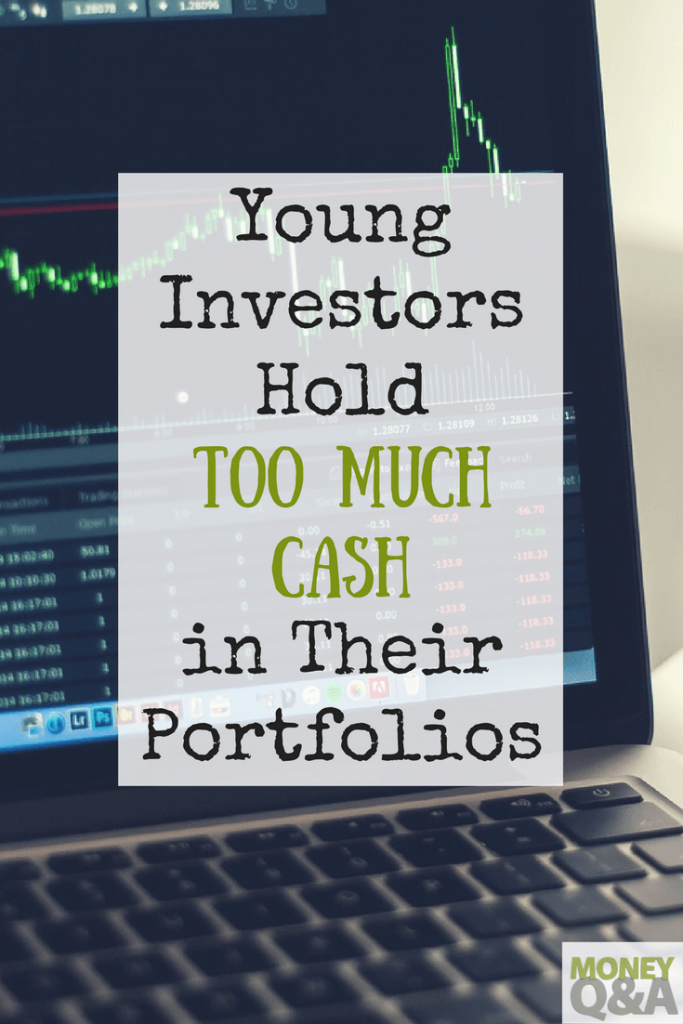
A recent survey by MFS Investment Management, the nation’s oldest mutual fund company, found that young investors are staying away from the stock market and holding large cash positions. In fact, the survey shows that the youngest investors, those of Generation Y, are actually increasing their cash positions in their nest eggs while shunning the stock market to a large degree.
While it can make young investors have a little better feeling when they try and simply protect their principle, far too many young investors have too much of their portfolio in cash.
How Much Cash Is Too Much?
The survey by MFS Investment Management found that Generation Y investors, which are defined as young adults who were born in the 1980s and 1990s, are holding 30% of their investment portfolios in cash.
That age group has also ramped up their liquid holdings over the past year as well. Over 40% of Generation Y investors have been increasing their cash position this past year as well. This is too large of a cash position for young investors.
Aside from having a fully funded emergency fund of three to six months of living expenses, there is no need to have more than 5% to 10% of your entire investing portfolio or nest egg in cash or cash equivalents such as money market funds, savings accounts, ultra short-term bonds, and certificates of deposit. There are several short term cash investments that they could choose as well.
These low stock and mutual fund share prices are also a buying opportunity, and young investors should put that extra cash to work.
Why Young Investors Are Holding So Much Cash
Young investors are beat up. They started their young adult lives in many cases watching the dot com crash and then the housing bubble burst. Many young workers in America have been caught up in the housing crisis while watching their Roth IRAs and 401k balances plummet.
It is not the hello and welcome to the real world that all of us young investors were hoping for after graduating from college and entering the workforce. Many people in the news media like to call it the “Lost Decade”, but I have always looked at it as the time when stock have been on sale the most.
Time Is Our Greatest Factor
Time is the best thing that a young investor has on his or her side. Those just graduating from college or just entering the workforce have not one but several decades of market ups and downs to live through and profit from. Young investors cannot let the current market turmoil deter them and give them a myopic view on the stock market’s returns and likelihood of returns in the future.
If young investors sit out on the sidelines now, they will grow to regret their lack of growth in the future. Every year that young investors have cash sitting on the sidelines and not invested, prevents decades of compounding interest to work in their favor. There are several short term cash investments that you could use to put that money to work.
Now Is The Time To Swing For The Fences
Now is the time, if you are in your 20s and 30s, to swing for the fences with your investments. If you strike out, you have time to make a comeback since you still have decades away from retirement in your 60s. According to a survey by the Investment Company Institute, only 34% of investors under 35 years old say that they are willing to take above-average risks in their investment portfolio.
But, in 2005, the number was closer to 50%. I am a big fan of taking the risks now while a large majority of my investments in stocks, stock mutual funds, and other investments. I personally have very little in cash and bonds (less than 5%), but I also have the luxury of having decades until I am at retirement age.
Over the past 100 years, the U.S. stock market has had an annual rate of return of over 8%. Granted, there are down years, and there are even crashes in the market. But, there are bull markets and rallies that young investors forget about or haven’t experienced yet. Do not let these last several years make young investors forget that fact.
I understand that there is hesitation to investing with the recent recession and a possible double-dip looming, but now is the time to be buying if you have decades away from retirement instead of 35% of the MFS Investment Management survey respondents aged 25 to 64 saying they never feel comfortable investing in the stock market again.
There will be another bull market eventually, and you won’t want to miss it by sitting on the sidelines with all of your money sitting liquid in cash earning peanuts in savings and money market funds
If you’re looking for places to keep traditional investment accounts, you might want to check out investing with Betterment or Stash Invest.
The newest robo-advisor on the market called M1 Finance gives the more established, sophisticated investors great investing options. M1 Finance simplifies the investment process for beginning and experienced investors alike. Unlike other robo-advisors, M1 Finance does not charge a fee, and it gives you the option of taking more control over your investments if you want them (and less if you don’t).


You don’t have to worry about missing out on compounding interest because you are not receiving the power of compounding interest. The most benefits from compounding occur in the latter parts of the time estimates. This is why all the baby boomers are screwed because their financial planner drew up plans for their money to continue to compound and it hasn’t. (Last 10 years flat) Don’t worry about missing the bull market, your 100% return in the bull market will just make up for the 50% loss you have taken waiting for the bull market…
Brent,
Compounding interest or not during the down turn, you are missing out on future compunding if you aren’t contributing at all during these past few years.
Unfortunately, I am one of those people who are holding on to cash. I need to start moving into funds but not sure when the right time is… I’m still waiting for the market to decline another 10-15% but it may be a while.
Ultimate –
It is kind of like waiting to get pregnant until you can afford it. If you waited that long, you would never have children. I see the same thing in your case with holding cash. You could be waiting forever for another 10-15% decline. What if it skyrockets from here? You would have missed the boat. In my opinion, the right time to invest is always now and not waiting.
I haven’t heard this notion of only keeping 5-10% of your nest egg in cash. How do you count money that you are saving for a specific purpose? For instance, say you have your 3-6 month emergency fund but you have separate savings for a house down payment. Are you saying your house fund should be within the 5-10% that you have in cash holdings or does that money not count in this equation because it’s already been spoken for?
Penny,
You bring up a great point. There are no hard and fast rules…just a rule of thumb. It would be nice if 3-6 months worth of an emergency fund was 10% or less of your total portfolio, but that would be hard for many young people. it is definiltey something to play by ear a little bit, but I would caution to blindly holding onto cash for the sake of not being in the market and being scared to invest. Depending on when you thought that you would realistically purchase a house, your down payment fund may not have to be in cash or cash equivilants.
My generation is avoiding the market and remaining liquid or in cash because we see this market as highly overvalued. Cash avails the opportunity to go all-in when the next inevitable drop occurs. Like you said, we have already been through 2 such drops in our adult lives (since 2000). Bracing for the next is smart. Baby Boomers are about to start cashing out in droves, as they need the money for retirement. We’re all in for a big shock when that happens!